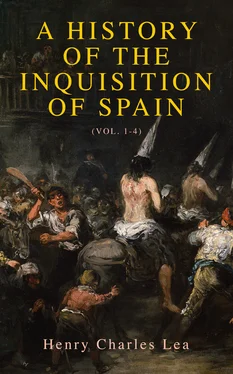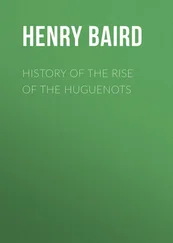The long reign of the feeble Juan II, from 1406 to 1454, was followed by that of the feebler Henry IV, popularly known as El Impotente. In the Seguro de Tordesillas, in 1439, the disaffected nobles virtually dictated terms to Juan II. [10]In the Deposition of Ávila, in 1465, they treated Henry IV with the bitterest contempt. His effigy, clad in mourning and adorned with the royal insignia, was placed upon a throne and four articles of accusation were read. For the first he was pronounced unworthy of the kingly station, when Alonso Carrillo, Archbishop of Toledo, removed the crown; for the second he was deprived of the administration of justice, when Álvaro de Zuñiga, Count of Plasencia, took away the sword; for the third he was deprived of the government, when Rodrigo Pimentel, Count of Benavente, struck the sceptre away; for the fourth he was sentenced to lose the throne, when Diego López de Zuñiga tumbled the image from its seat with an indecent gibe. It was scarce more than a continuation of the mockery when they elected as his successor his brother Alfonso, a child eleven years of age. [11]
VIOLENCE AND TREACHERY
The lawless independence of the nobles and the effacement of the royal authority may be estimated from a single example. At Plasencia two powerful lords, Garcí Alvárez de Toledo, Señor of Oropesa, and Hernan Rodríguez de Monroy, kept the country in an uproar with their armed dissension. Juan II sent Ayala, Señor of Cebolla, with a royal commission to suppress the disorder. Monroy, in place of submitting, insulted Ayala, who as a “buen caballero” disdained to complain to the king and preferred to avenge himself. Juan on hearing of this summoned to his presence Monroy, who collected all his friends and retainers and set out with a formidable army. Ayala made a similar levy and set upon him as he passed near Cebolla. There was a desperate battle in which Ayala was worsted and forced to take refuge in Cebolla, while Monroy passed on to Toledo and, when he kissed the king’s hands, Juan told him that he had sent for him to cut off his head, but as Ayala had preferred to right himself he gave Monroy a God-speed on his journey home and washed his hands of the whole affair. [12]
The ricosomes who thus were released from all the restraint of law had as little respect for those of honor and morality. The virtues which we are wont to ascribe to chivalry were represented by such follies as the celebrated Passo Honroso of Suero de Quiñones, when that knight and his nine comrades, in 1434, kept, in honor of their ladies, for thirty days against all comers, the pass of the Bridge of Orbigo, at the season of the feast of Santiago and sixty-nine challengers presented themselves in the lists. [13]With exceptions such as this, and a rare manifestation of magnanimity, as when the Duke of Medina Sidonia raised an army and hastened to the relief of his enemy, Rodrigo Ponce de Leon besieged in Alhama, [14]the record of the time is one of the foulest treachery, from which truth and honor are absent and human nature displays itself in its basest aspect. According to contemporary belief, Ferdinand was indebted for the crown of Aragon to the poisoning of his brother, the deeply mourned Carlos, Prince of Viana, while the crown of Castile fell to Isabella through the similar taking off of her brother Alfonso. [15]
A characteristic incident is one involving Doña Maria de Monroy, who married into the great house of Henríquez of Seville, and was left a widow with two boys. When the youths were respectively eighteen and nineteen years old they were close friends of two gentlemen of Seville named Mançano. The younger brother, dicing with them in their house, was involved in a quarrel with them, when they set upon him with their servants and slew him. Then, fearing the vengeance of the elder brother, they sent him a friendly message to come and play with them; when he came they led him along a dark corridor in which they suddenly turned upon him and stabbed him to death. When the disfigured corpses of her boys were brought to Doña María she shed no tears, but the fierceness of her eyes frightened all who looked upon her. The Mançanos promptly took horse and fled to Portugal, whither Doña María followed them in male attire with a band of twenty cavaliers. Her spies were speedily on the track of the fugitives; within a month of the murders she came at night to the house where they lay concealed; the doors were broken in and she entered with ten of her men while the rest kept guard outside. The Mançanos put themselves in defence and shouted for help, but before the neighbors could assemble she had both their heads in her left hand and was galloping off with her troop, never stopping till she reached Salamanca, where she went to the church and laid the bloody heads on the tomb of her boys. Thenceforth she was known as Doña María la Brava, and her exploit led to long and murderous feuds between the Monroyes and the Mançanos. [16]
Doña María was but a type of the unsexed women, mugeres varoniles , common at the time, who would take the field or maintain their place in factious intrigue with as much ferocity and pertinacity as men. Ferdinand could well look without surprise on the activity in court and camp of his queen Isabella, when he remembered the prowess of his mother, Juana Henríquez, who had secured for him the crown of Aragon. Doña Leonora Pimentel, Duchess of Arévalo, was one of these; of the Countess of Medellin it was said that no Roman captain could get the better of her in feats of arms, and the Countess of Haro was equally noted. The Countess of Medellin, indeed, kept her own son in prison for years while she enjoyed the revenues of his town of Medellin and, when Queen Isabella refused to confirm her possession of the place, she transferred her allegiance to the King of Portugal to whom she delivered the castle of Merida. At the same time the Moorish influence, which was so strong in Castile, occasionally led to the opposite extreme. The Duke of Najera kept his daughters in such absolute seclusion that no man, not even his sons, was permitted to enter the apartments reserved for the women, and the reason he alleged—that the heart does not covet what the eye does not see—was little flattering to either sex. [17]
VIRTUAL ANARCHY
The condition of the common people can readily be imagined in this perpetual strife between warlike, ambitious and unprincipled nobles, now uniting in factions which involved the whole realm in war, and now contenting themselves with assaults upon their neighbors. The land was desolated; the husbandman scarce could take heart to plant his seed, for the harvest was apt to be garnered with the sword and thrust into castles to provision them against siege. As a writer of the period tells us, there was neither law nor justice save that of arms. [18]In a letter describing the universal anarchy, written by Hernando del Pulgar from Madrid, in 1473, he says that for more than five years there has been no communication from Murcia, where the family of Fajardo reigned supreme—it is, he says, as foreign a land as Navarre. [19]That the roads were unsafe for trade or travel was a matter of course; every petty hidalgo converted his stronghold into a den of robbers, and what these left was swept away by bands of Free Companions. [20]Disorder reigned supreme and all-pervading. The crown was powerless and the royal treasury exhausted. Improvident grants of lands and revenues and jurisdictions, to bribe the treacherous fidelity of faithless nobles, or to gratify worthless favorites, were made, till there was nothing left to give, and then Henry IV bestowed licenses for private mints, until there were a hundred and fifty of them at work, flooding the land with base money, to the unutterable confusion of the coinage and the impoverishment of the people. [21]The Córtes of Madrid, in 1467, and of Ocaña in 1469, called on Henry to resume his improvident grants, and those of Madrigal, in 1476, repeated the urgency to Ferdinand and Isabella, who had been forced to follow his example. To this the sovereigns replied thanking the Córtes and postponing the matter. They did not feel themselves strong enough until 1480, when at the Córtes of Toledo, they resumed thirty million maravedís of revenue which had been alienated during the troubles, and this after an investigation which left untouched the gifts to loyal subjects and only withdrew such as had been extorted. [22]Respect for the crown had fallen as low as its revenues. A story told of the Count of Benavente shows how difficult it was, even after the accession of Isabella, for the nobles to recognize that they owed any obedience to the sovereign. He was walking with the queen when a woman came weeping and begging justice, saying that he had had her husband slain in spite of a royal safe-conduct. She showed the letter which her husband had carried in his breast, pierced by the blow which had ended his life, when the count jeeringly remarked “A cuirass would have been of more service.” Piqued by this Isabella said “Count do you then not wish there was no king in Castile?” “Rather,” said he, “I wish there were many.” “And why?” “Because then I should be one of them.” [23]
Читать дальше












